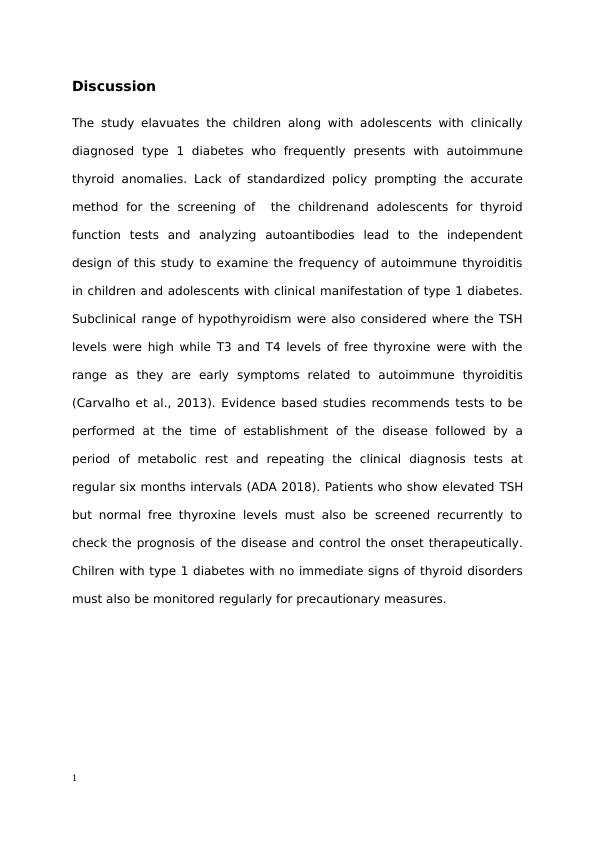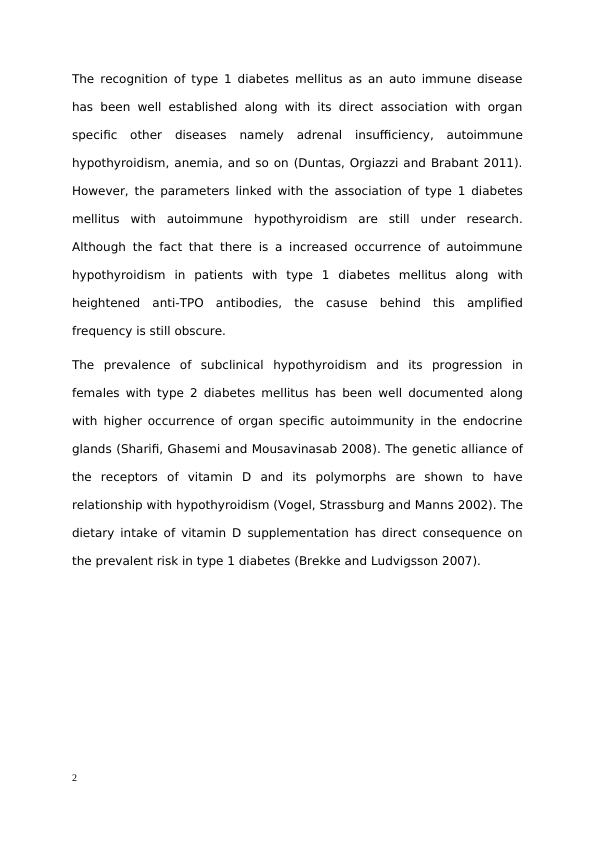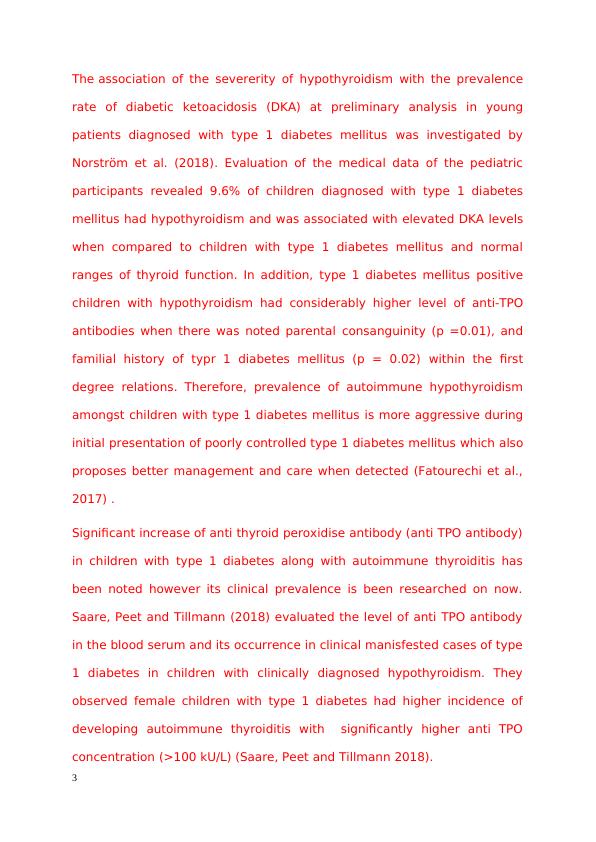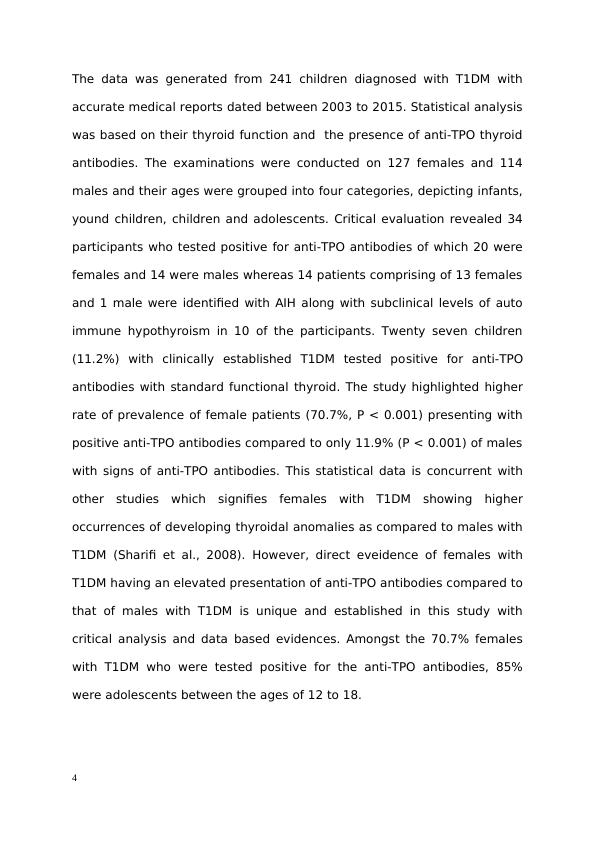Association of Autoimmune Thyroiditis in Children and Adolescents with Type 1 Diabetes
18 Pages3759 Words163 Views
Added on 2022-11-28
About This Document
This study examines the frequency of autoimmune thyroiditis in children and adolescents with clinical manifestation of type 1 diabetes. It evaluates the screening methods and recommends regular monitoring for early detection and management.
Association of Autoimmune Thyroiditis in Children and Adolescents with Type 1 Diabetes
Added on 2022-11-28
ShareRelated Documents
Discussion
The study elavuates the children along with adolescents with clinically
diagnosed type 1 diabetes who frequently presents with autoimmune
thyroid anomalies. Lack of standardized policy prompting the accurate
method for the screening of the childrenand adolescents for thyroid
function tests and analyzing autoantibodies lead to the independent
design of this study to examine the frequency of autoimmune thyroiditis
in children and adolescents with clinical manifestation of type 1 diabetes.
Subclinical range of hypothyroidism were also considered where the TSH
levels were high while T3 and T4 levels of free thyroxine were with the
range as they are early symptoms related to autoimmune thyroiditis
(Carvalho et al., 2013). Evidence based studies recommends tests to be
performed at the time of establishment of the disease followed by a
period of metabolic rest and repeating the clinical diagnosis tests at
regular six months intervals (ADA 2018). Patients who show elevated TSH
but normal free thyroxine levels must also be screened recurrently to
check the prognosis of the disease and control the onset therapeutically.
Chilren with type 1 diabetes with no immediate signs of thyroid disorders
must also be monitored regularly for precautionary measures.
1
The study elavuates the children along with adolescents with clinically
diagnosed type 1 diabetes who frequently presents with autoimmune
thyroid anomalies. Lack of standardized policy prompting the accurate
method for the screening of the childrenand adolescents for thyroid
function tests and analyzing autoantibodies lead to the independent
design of this study to examine the frequency of autoimmune thyroiditis
in children and adolescents with clinical manifestation of type 1 diabetes.
Subclinical range of hypothyroidism were also considered where the TSH
levels were high while T3 and T4 levels of free thyroxine were with the
range as they are early symptoms related to autoimmune thyroiditis
(Carvalho et al., 2013). Evidence based studies recommends tests to be
performed at the time of establishment of the disease followed by a
period of metabolic rest and repeating the clinical diagnosis tests at
regular six months intervals (ADA 2018). Patients who show elevated TSH
but normal free thyroxine levels must also be screened recurrently to
check the prognosis of the disease and control the onset therapeutically.
Chilren with type 1 diabetes with no immediate signs of thyroid disorders
must also be monitored regularly for precautionary measures.
1

The recognition of type 1 diabetes mellitus as an auto immune disease
has been well established along with its direct association with organ
specific other diseases namely adrenal insufficiency, autoimmune
hypothyroidism, anemia, and so on (Duntas, Orgiazzi and Brabant 2011).
However, the parameters linked with the association of type 1 diabetes
mellitus with autoimmune hypothyroidism are still under research.
Although the fact that there is a increased occurrence of autoimmune
hypothyroidism in patients with type 1 diabetes mellitus along with
heightened anti-TPO antibodies, the casuse behind this amplified
frequency is still obscure.
The prevalence of subclinical hypothyroidism and its progression in
females with type 2 diabetes mellitus has been well documented along
with higher occurrence of organ specific autoimmunity in the endocrine
glands (Sharifi, Ghasemi and Mousavinasab 2008). The genetic alliance of
the receptors of vitamin D and its polymorphs are shown to have
relationship with hypothyroidism (Vogel, Strassburg and Manns 2002). The
dietary intake of vitamin D supplementation has direct consequence on
the prevalent risk in type 1 diabetes (Brekke and Ludvigsson 2007).
2
has been well established along with its direct association with organ
specific other diseases namely adrenal insufficiency, autoimmune
hypothyroidism, anemia, and so on (Duntas, Orgiazzi and Brabant 2011).
However, the parameters linked with the association of type 1 diabetes
mellitus with autoimmune hypothyroidism are still under research.
Although the fact that there is a increased occurrence of autoimmune
hypothyroidism in patients with type 1 diabetes mellitus along with
heightened anti-TPO antibodies, the casuse behind this amplified
frequency is still obscure.
The prevalence of subclinical hypothyroidism and its progression in
females with type 2 diabetes mellitus has been well documented along
with higher occurrence of organ specific autoimmunity in the endocrine
glands (Sharifi, Ghasemi and Mousavinasab 2008). The genetic alliance of
the receptors of vitamin D and its polymorphs are shown to have
relationship with hypothyroidism (Vogel, Strassburg and Manns 2002). The
dietary intake of vitamin D supplementation has direct consequence on
the prevalent risk in type 1 diabetes (Brekke and Ludvigsson 2007).
2

The association of the severerity of hypothyroidism with the prevalence
rate of diabetic ketoacidosis (DKA) at preliminary analysis in young
patients diagnosed with type 1 diabetes mellitus was investigated by
Norström et al. (2018). Evaluation of the medical data of the pediatric
participants revealed 9.6% of children diagnosed with type 1 diabetes
mellitus had hypothyroidism and was associated with elevated DKA levels
when compared to children with type 1 diabetes mellitus and normal
ranges of thyroid function. In addition, type 1 diabetes mellitus positive
children with hypothyroidism had considerably higher level of anti-TPO
antibodies when there was noted parental consanguinity (p =0.01), and
familial history of typr 1 diabetes mellitus (p = 0.02) within the first
degree relations. Therefore, prevalence of autoimmune hypothyroidism
amongst children with type 1 diabetes mellitus is more aggressive during
initial presentation of poorly controlled type 1 diabetes mellitus which also
proposes better management and care when detected (Fatourechi et al.,
2017) .
Significant increase of anti thyroid peroxidise antibody (anti TPO antibody)
in children with type 1 diabetes along with autoimmune thyroiditis has
been noted however its clinical prevalence is been researched on now.
Saare, Peet and Tillmann (2018) evaluated the level of anti TPO antibody
in the blood serum and its occurrence in clinical manisfested cases of type
1 diabetes in children with clinically diagnosed hypothyroidism. They
observed female children with type 1 diabetes had higher incidence of
developing autoimmune thyroiditis with significantly higher anti TPO
concentration (>100 kU/L) (Saare, Peet and Tillmann 2018).
3
rate of diabetic ketoacidosis (DKA) at preliminary analysis in young
patients diagnosed with type 1 diabetes mellitus was investigated by
Norström et al. (2018). Evaluation of the medical data of the pediatric
participants revealed 9.6% of children diagnosed with type 1 diabetes
mellitus had hypothyroidism and was associated with elevated DKA levels
when compared to children with type 1 diabetes mellitus and normal
ranges of thyroid function. In addition, type 1 diabetes mellitus positive
children with hypothyroidism had considerably higher level of anti-TPO
antibodies when there was noted parental consanguinity (p =0.01), and
familial history of typr 1 diabetes mellitus (p = 0.02) within the first
degree relations. Therefore, prevalence of autoimmune hypothyroidism
amongst children with type 1 diabetes mellitus is more aggressive during
initial presentation of poorly controlled type 1 diabetes mellitus which also
proposes better management and care when detected (Fatourechi et al.,
2017) .
Significant increase of anti thyroid peroxidise antibody (anti TPO antibody)
in children with type 1 diabetes along with autoimmune thyroiditis has
been noted however its clinical prevalence is been researched on now.
Saare, Peet and Tillmann (2018) evaluated the level of anti TPO antibody
in the blood serum and its occurrence in clinical manisfested cases of type
1 diabetes in children with clinically diagnosed hypothyroidism. They
observed female children with type 1 diabetes had higher incidence of
developing autoimmune thyroiditis with significantly higher anti TPO
concentration (>100 kU/L) (Saare, Peet and Tillmann 2018).
3

The data was generated from 241 children diagnosed with T1DM with
accurate medical reports dated between 2003 to 2015. Statistical analysis
was based on their thyroid function and the presence of anti-TPO thyroid
antibodies. The examinations were conducted on 127 females and 114
males and their ages were grouped into four categories, depicting infants,
yound children, children and adolescents. Critical evaluation revealed 34
participants who tested positive for anti-TPO antibodies of which 20 were
females and 14 were males whereas 14 patients comprising of 13 females
and 1 male were identified with AIH along with subclinical levels of auto
immune hypothyroism in 10 of the participants. Twenty seven children
(11.2%) with clinically established T1DM tested positive for anti-TPO
antibodies with standard functional thyroid. The study highlighted higher
rate of prevalence of female patients (70.7%, P < 0.001) presenting with
positive anti-TPO antibodies compared to only 11.9% (P < 0.001) of males
with signs of anti-TPO antibodies. This statistical data is concurrent with
other studies which signifies females with T1DM showing higher
occurrences of developing thyroidal anomalies as compared to males with
T1DM (Sharifi et al., 2008). However, direct eveidence of females with
T1DM having an elevated presentation of anti-TPO antibodies compared to
that of males with T1DM is unique and established in this study with
critical analysis and data based evidences. Amongst the 70.7% females
with T1DM who were tested positive for the anti-TPO antibodies, 85%
were adolescents between the ages of 12 to 18.
4
accurate medical reports dated between 2003 to 2015. Statistical analysis
was based on their thyroid function and the presence of anti-TPO thyroid
antibodies. The examinations were conducted on 127 females and 114
males and their ages were grouped into four categories, depicting infants,
yound children, children and adolescents. Critical evaluation revealed 34
participants who tested positive for anti-TPO antibodies of which 20 were
females and 14 were males whereas 14 patients comprising of 13 females
and 1 male were identified with AIH along with subclinical levels of auto
immune hypothyroism in 10 of the participants. Twenty seven children
(11.2%) with clinically established T1DM tested positive for anti-TPO
antibodies with standard functional thyroid. The study highlighted higher
rate of prevalence of female patients (70.7%, P < 0.001) presenting with
positive anti-TPO antibodies compared to only 11.9% (P < 0.001) of males
with signs of anti-TPO antibodies. This statistical data is concurrent with
other studies which signifies females with T1DM showing higher
occurrences of developing thyroidal anomalies as compared to males with
T1DM (Sharifi et al., 2008). However, direct eveidence of females with
T1DM having an elevated presentation of anti-TPO antibodies compared to
that of males with T1DM is unique and established in this study with
critical analysis and data based evidences. Amongst the 70.7% females
with T1DM who were tested positive for the anti-TPO antibodies, 85%
were adolescents between the ages of 12 to 18.
4

End of preview
Want to access all the pages? Upload your documents or become a member.
Related Documents
Research on the Thyroid and Diabeteslg...
|5
|1414
|17
Immune System and Endocrine System of Mammalian Immune Systemlg...
|11
|2248
|249
HASHIMOTO THYROIDITIS.lg...
|3
|460
|350
Differential Diagnosislg...
|5
|808
|447
Celiac Disease and Diabetes: A Case Studylg...
|7
|1966
|74
Management of Diabetes Mellitus: Pathophysiology, Polyuria, and Holistic Approachlg...
|16
|5900
|76
